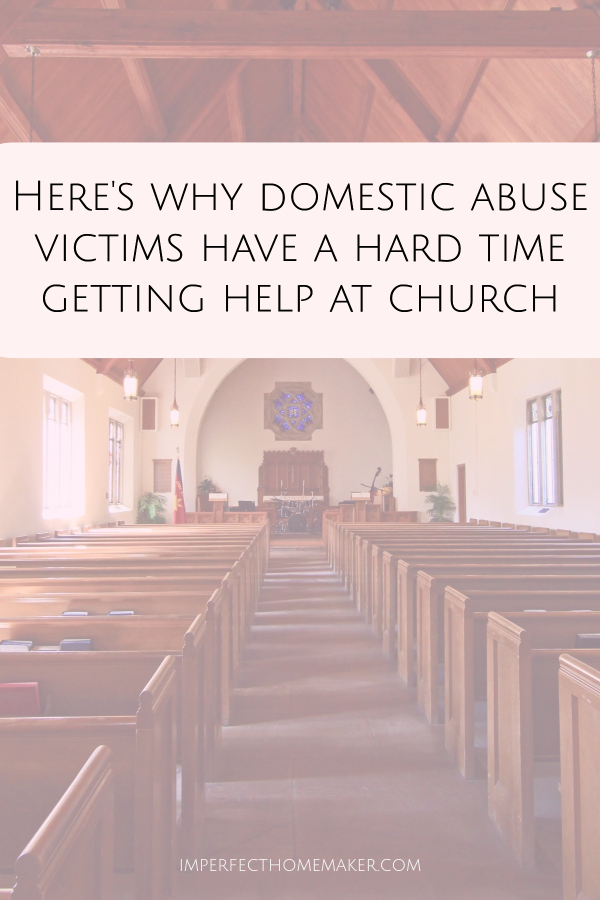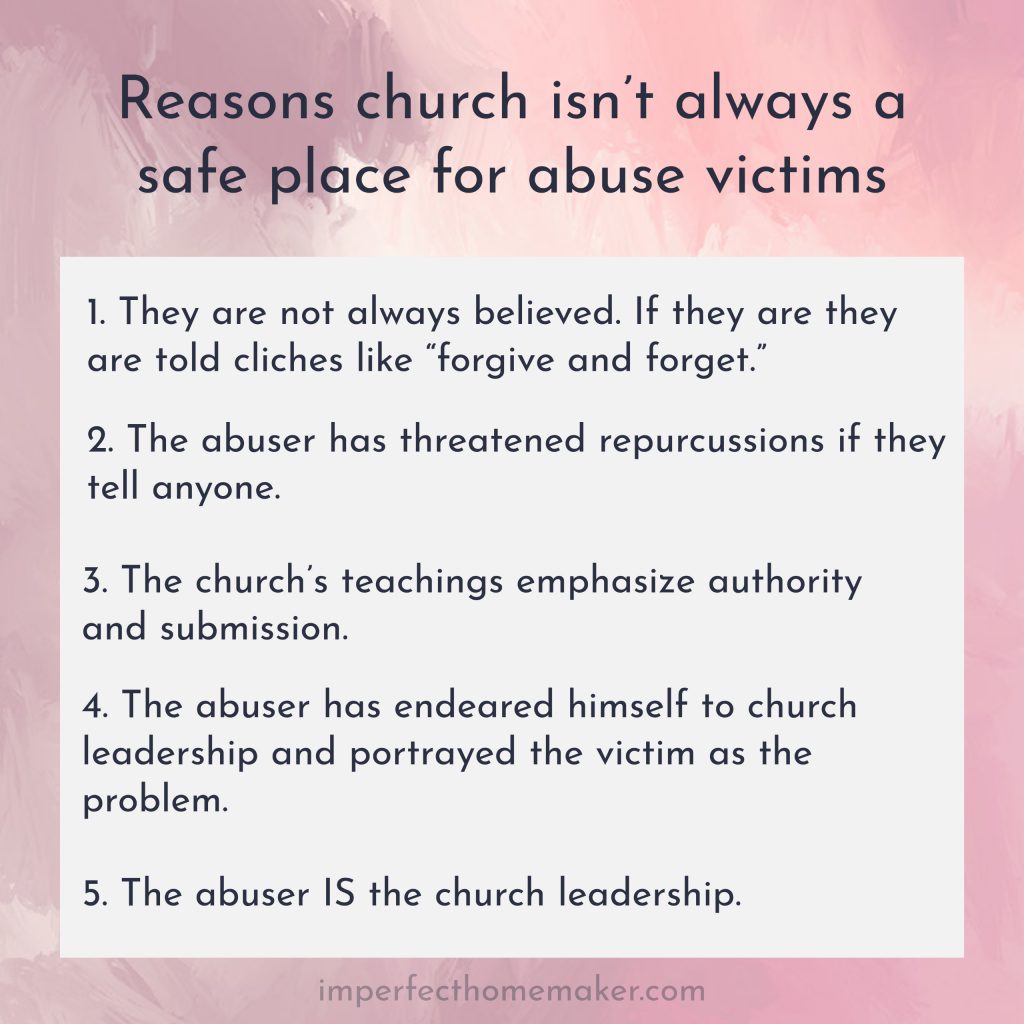Here’s Why Domestic Abuse Victims Have a Hard Time Getting Help at Church
On Sunday, I posted on Instagram about women who find themselves in the bathroom stall at church, crying because their abusive husband is smiling, chatting, and fitting right in with all the men in the lobby. But she knows the truth. She knows that the person he pretends to be at church is not the same person he is at home.
A response I received was, “Why doesn’t she go to the church leadership for help?”
While that might seem an obvious solution, it’s unfortunately not usually that simple.
I reached out to a group of abuse survivors and asked them to share their answers to the question, “Why doesn’t a victim go to her church leadership for help?”
So far I’ve received over 200 responses, and they keep coming.
I sorted these responses into categories to make it easier to see the difficulties for an abuse victim in asking for and receiving help from her church. Some of what you read are direct quotes; some are paraphrases. There is not a single response on this page that was not submitted in some variation by multiple people. These are not the outliers; they are responses that victims receive nine times out of ten.
My goal in sharing this is to help raise awareness that these women are in your church. I hope that by understanding how great the obstacles are, you can be the one to help create change so that the church can be a safe place for those who need protection and care.
“They did not believe me.”
“They did not want to get involved.”
Even though the staff believed me, they added a ton of chaos to the situation. Didn't listen to me or experts on how to handle the situation which my kids and I even more unsafe. Tried to control what I did. It was horrible.
“They told me to keep being a submissive wife.”
“They told me not to talk negative about him.”
I was a child of DV. My dad was adored by our church. I went twice to the “lead” pastor, begging him to help us. He told me, “You can’t tell anyone about your dad’s sin because it’ll be too hard for him to repair his reputation once he is repentant.”
“They told me to read a book that would fix my marriage.”
“They prayed with me and then never said anything else about it.”
I told the pastor my then husband was raping me, hitting me, holding knives to my throat and guns to my kids heads. The pastor told me the Bible made no exceptions for divorce for anything other than continuous adultery and I was not free to leave for abuse.
“They said I neeeded to forgive and keep going as if nothing has happened.”
“They asked what I did to make him treat me like that.”
My pastor: “Wouldn’t you rather suffer some temporal abuse in this life than for you and your children to suffer eternity in hell if you leave the spiritual protection of your male headship and marriage?”
“They recommended I clean the house more and have more sex.”
“They ignored me and later terminated my membership.”
“He had beaten my children but they told me I shouldn't be separated from him.”
The church kicked out [my friend] for daring to divorce her abuser, then sided with the pedophile to convince the judge to force reunification with the daughters he molested.
“They told me it would be unsubmissive to pay the bills so I could have power and water to take care of my children, because my husband said I wasn't allowed to.”
“They told me if I took my child to the doctor wen he needed medical attention that I was usurping authority over my husband, because my husband said no.”
Over the course of my 30 year marriage, I went to at least 3 different pastor's wives, two different pastors, a Christian counselor, a church counselor, and numerous church friends seeking help. All efforts were concentrated on my staying, learning to cope with the situation, becoming a better wife, and trusting God to change his heart.
Another reason that victims of abuse did not simply go tell their church leadership:
I WAS AFRAID TO TELL
“I knew there would be repercussions for me if he found out I had told.”
“I shared some of the smaller things to see how they responded and they minimized it. I knew at that point that it would not be safe to share any more of what was going on.
“I already knew they would support him and ostracize me. I would rather be alone crying in the bathroom than to be ostracized by the whole church.”
“It’s exhausting to try to explain it. You’re vulnerable and don’t know who you can trust. I was afraid I’d be accused of running him through the mud.”
Trying to explain an abusive relationship to someone whose never experienced it is like trying to explain the difference between red and blue to a blind person.
Yet another issue was this:
I KNEW THE LEADERSHIP’S BELIEFS ABOUT MEN AND WOMEN WOULD MAKE IT IMPOSSIBLE TO RECEIVE HELP
“They portray women as irrational, high maintenance and hard to please.”
“They glorify abusive behaviors as ‘Biblical manhood.'”
“The doctrine of the husband being in authority over the wife meant they would view me as the problem if I refused to do what he said.”
“There’s so much emphasis on submission and laying down your life that I believed it was my responsibility to suffer silently.”
“I went to Bible study with his handprints around my neck. They prayed for my submission.”
From the pulpit, the pastor stated that abuse was a valid reason for divorce but went on to say. “Some people say they're being abused but they aren't.”
Another reason victims do not tell is that they know
THE ABUSER HAS ENDEARED HIMSELF TO CHURCH LEADERSHIP
“He is buddy buddy with the church leadership. He shows up early for every church function. He sets up chairs beforehand and helps sweep floors afterward. He has already shared mournful prayer requests about his wife’s “mental Illness” or “spiritual problems” to turn people against me before I could ever ask for help.”
“My abuser had preemptively spoken to every pastor at my church under the guise of praying for me saying I was struggling with anxiety and our marriage was suffering because of “my mental health issues”. By the time I was out of the fog and ready to admit I was being abused their opinions had already been tainted.”
“Through his charismatic ability to influence and manipulate his perspective of our marriage to church leadership, my ex successfully was able to have church leadership and the congregation turn their backs on me without me even knowing what his whispers were doing. I was devastated. He managed to convince our church that I was a horrible person… a slut, crazy, bad mother… and for them to pray with him to pray for me.”
“He was always speaking with them behind my back and making me out to be crazy. They were inexperienced with abuse and always excused his behavior.”
My husband is a world class actor and can portray himself to be a godly man.”
Finally, one of the reasons victims cannot always “just go tell the church leadership” is that
THE ABUSER *IS* THE CHURCH LEADERSHIP
“My husband was the pastor”
“Where could a pastor's wife go?”
“All the people in leadership that I told thought his abusive behaviors were normal. They treated their own families the same way.”
As the child/teen of a couple in leadership: I didn't dare go to church leadership because THEY WERE LEADERSHIP. It was also pounded into my head from a very early age about how children of “good Christian parents” grow up and are brainwashed by “a therapist” or “secularism” to make false abuse accusations against these “good, innocent” parents. False accusations, false memories, etc were a frequent topic of warning in our home. Who would ever have believed me?
My friends, I grieve that such egregious harm is being done and that the vulnerable are being further oppressed.
I hope you grieve also.
We must not be ignorant that there are wolves who wander amongst the sheep in disguise. Instead of rushing to defend the reputation of a person you thought was good, be willing to experience the discomfort and disorientation of acknowledging that someone is not who you thought they were.
We must stop throwing cliches around as easy answers to the problems people face.
We must understand how to recognize abuse so that we do not address it as a marriage issue. Many victims are attempting to disclose abuse, but it is missed because it sounds to the untrained ear like a small problem and she is told she shouldn't be petty.
We must understand that many pastors have sought such a position becaue they are power hungry. While they may sound like godly men from the pulpit, their actions behind the scenes are controlling and manipulative. Such people must be exposed and removed.
There is much more that could be said, but this is only the beginning of my journey of using this platform to speak about such topics.
I hope you will prayerfully follow along, asking the Holy Spirit for understanding and humility so that we may care for the vulnerable in ways that truly point them to the love of God for them.


